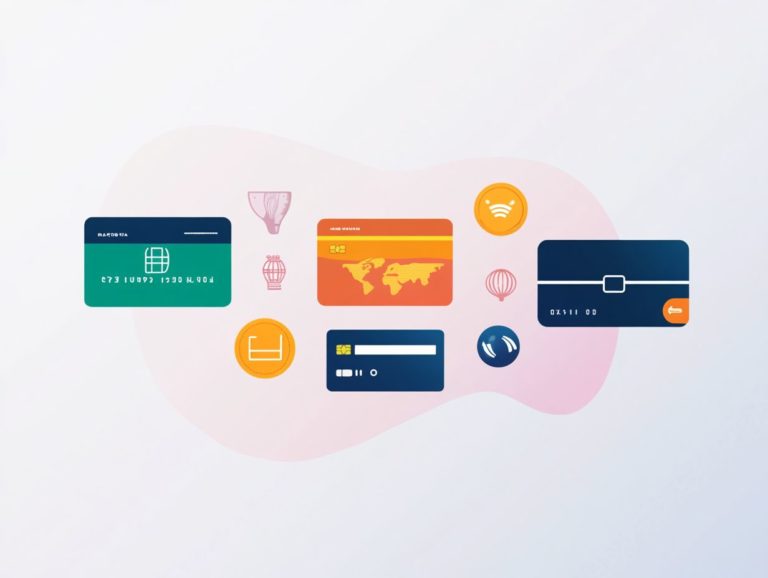The Impact of Credit Card Features on Your Budget
Credit cards can serve as a powerful financial tool, but understanding their features is crucial for aligning them with your budget.
From interest rates and fees to rewards programs and introductory offers, each element can significantly shape your spending habits. This article delves into the array of credit card features available, examining how they can impact your overall budget and offering tips for selecting and managing the right card tailored to your financial goals.
Whether you’re a seasoned credit card user or just starting out, you’ll uncover valuable insights to help you navigate your options effectively.
Contents
- Key Takeaways:
- Understanding Credit Card Features
- How Credit Card Features Affect Your Budget
- Choosing the Right Credit Card for Your Budget
- Managing Your Credit Card for a Healthy Budget
- Frequently Asked Questions
- What are some common features of credit cards that can impact my budget?
- How does the interest rate of a credit card affect my budget?
- Can annual fees on credit cards affect my budget?
- What is the importance of credit limits when it comes to budgeting?
- How can rewards programs on credit cards impact my budget?
- What are some potential penalty fees on credit cards that can affect my budget?
Key Takeaways:

- Understanding the different types of credit card features is crucial for managing your budget effectively.
- Interest rates, fees, rewards programs, introductory offers, and credit limits can significantly impact your budget when using a credit card.
- It is important to assess your spending habits and compare different credit card features to choose the right one for your budget.
Understanding Credit Card Features
Understanding the features of credit cards, especially travel credit cards, is essential for anyone aiming to responsibly incorporate credit into their financial strategy. A credit card can be a powerful ally in budgeting, allowing you to build your credit history while effectively managing your monthly income and expenses.
With various features such as interest rates, rewards programs, and consumer protections like purchase and fraud protection, it’s vital to understand the role of credit card benefits in your lifestyle as they weave into your overall budgeting approach. Equipped with this understanding, you can make informed decisions that streamline your billing process, help you avoid debt, and maximize your rewards.
Types of Credit Card Features
Credit cards come packed with a variety of features tailored to meet your unique needs, enhancing both the ease and security of your purchases.
These features, ranging from interest rates and cash back options to rewards points, travel benefits, and strong fraud protection, can significantly support your budgeting efforts. By understanding credit card terms, you can avoid accumulating debt, while strategically leveraging cash back options allows you to save on everyday expenses.
If you travel frequently, take advantage of specific travel benefits that can lead to savings on flights and accommodations. Robust fraud protection allows you to spend confidently and responsibly, ultimately contributing to your overall financial well-being.
How Credit Card Features Affect Your Budget
The features of credit cards can profoundly shape your budgeting strategy and overall financial plan, as they dictate how you track spending. Understanding why credit card features matter for your wallet is essential for managing expenses effectively.
By understanding the nuances of interest rates, rewards programs, and fees, you can better calculate your expenses and strategically plan for any potential debt. This understanding helps you create a household plan that aligns seamlessly with your monthly income and financial aspirations.
Interest Rates and Fees
Interest rates and various fees tied to credit cards can significantly affect your overall financial health and budgeting strategy, so it’s crucial to know the top features to look for in a credit card.
Understanding how these elements work gives you the power to make informed decisions about your spending habits. High interest rates can escalate rapidly on outstanding balances, resulting in increased debt and prolonged repayment periods.
Hidden costs, such as annual fees, late fees, and balance transfer fees, can accumulate quickly, transforming what seemed like a great deal into a less appealing option. By paying close attention to these factors, you can better manage your expenses and steer clear of financial pitfalls that might disrupt your carefully crafted budget.
Being informed about credit card costs is vital for controlling your finances and achieving long-term stability.
Rewards Programs

Rewards programs in credit cards can provide you with significant benefits. They turn your everyday spending into amazing rewards like cash back, points, or frequent-flyer miles.
These programs are designed to help you maximize every dollar you spend! They also encourage smart spending habits. By selecting the right card, you can boost your earnings in categories where you spend the most, like groceries or gas. Many of these programs come with enticing travel benefits, opening the door to unforgettable getaways without straining your budget.
Incorporating rewards points into your budgeting strategy allows for smarter financial decisions. This ultimately makes it easier for you to save for larger expenses while enjoying the perks that come with responsible credit usage.
Introductory Offers
Introductory offers are a popular tactic used by credit cards to draw in new customers. They often feature enticing benefits such as zero liability for fraudulent charges and waived annual fees for the first year.
These promotions may include appealing perks like cashback rewards, bonus points, or a 0% APR on balance transfers for a limited time. While these offers can be tempting, think about how they match your financial goals.
Taking a closer look at the fine print of these deals can unveil hidden fees or higher interest rates that might kick in once the promotional period ends.
When budgeting, consider not just the immediate advantages but also the long-term financial implications. This way, applying for a new credit card aligns with a responsible management strategy that supports your overall financial health.
Credit Limit
A credit limit defines the maximum amount you can borrow on your credit card. It s an important part of managing your spending habits and household budget.
By understanding this limit, you can create a realistic budget that aligns with your borrowing capacity, fostering financial stability. Setting a budget that reflects your credit limit enables better oversight of your expenses, ensuring you don t exceed your means or accumulate unnecessary debt.
Evaluate your monthly income, recurring expenses, and extra spending, all while considering your credit limit in your financial strategies. This approach helps you cultivate healthier financial habits, reduces the risk of overextending your credit, and ultimately enhances your overall financial well-being.
Choosing the Right Credit Card for Your Budget
Selecting the ideal credit card for your budget requires thoughtful evaluation of your spending habits. Understanding the impact of credit cards on your credit score is crucial, as it ensures that your budgeting strategies align seamlessly with your financial objectives.
By defining your spending patterns and meticulously comparing the features of different credit cards, you empower yourself to make informed choices that suit your lifestyle and facilitate effective debt management.
Assessing Your Spending Habits
Assessing your spending habits is the essential first step in selecting the ideal credit card. This allows you to pinpoint which features will resonate most with your financial behaviors and needs.
By closely tracking your daily expenses whether through a mobile app or a simple spreadsheet you can uncover patterns that reveal where your money truly goes. This assessment covers everything from monthly bills to extra spending, shining a light on potential savings opportunities.
For example, if you find that travel is a significant part of your budget, choosing a rewards card that accrues airline miles or hotel points can significantly enhance your financial advantages.
Categorizing your purchases into distinct budgets, such as food, entertainment, and utilities, provides a clearer perspective. This ultimately steers you toward smarter credit card choices that maximize rewards while minimizing fees.
Start tracking your spending today!
Comparing Different Credit Card Features

Comparing different credit card features is essential for finding the best option that aligns with your unique financial situation and goals.
By closely looking at aspects like credit limits which determine how much you can borrow and interest rates that dictate the cost of carrying a balance, you can make more informed decisions.
Evaluating rewards programs, such as cashback or travel points, can significantly enhance the value you receive from your card.
You must consider how these factors align with your spending habits and financial objectives. This ensures you choose a credit card that meets your immediate needs and supports your long-term financial health.
Managing Your Credit Card for a Healthy Budget
Effectively managing your credit card is essential for maintaining a robust budget and practicing responsible credit usage. By carefully tracking your spending and setting clear limits, you can strategically prevent overspending.
This proactive approach will help you avoid the pitfalls of high interest rates and safeguard your financial stability for the future.
Tips for Responsible Credit Card Use
Practicing responsible credit card use is vital for your financial success. Here are several key strategies that can guide you in managing your credit wisely.
By developing a solid budget, you ll clearly understand your spending limits. This allows you to prioritize essential expenses over unnecessary ones.
Simplifying your billing processes whether through automated payments or keeping your statements organized can help you avoid missed due dates and those pesky late fees.
Planning for debt repayment is equally crucial. By setting aside a specific amount each month to chip away at your balances, you can prevent the accumulation of interest charges, making it much easier to maintain a healthy credit score.
These strategies promote better credit management and lay the groundwork for long-term financial stability.
Frequently Asked Questions
What are some common features of credit cards that can impact my budget?
Some common features of credit cards that can impact your budget include interest rates, annual fees, credit limits, and rewards programs as well as penalty fees.
How does the interest rate of a credit card affect my budget?

The interest rate of a credit card can significantly impact your budget. It is the percentage of charges that will be added to your balance each month. Understanding the importance of credit card feature transparency is crucial, as a higher interest rate means you will pay more in interest, potentially causing you to overspend and stretch your budget.
Can annual fees on credit cards affect my budget?
Yes, annual fees on credit cards can impact your budget. They are a set amount you must pay each year to use the card. This fee can take away from your available funds and make it harder to stick to your budget.
What is the importance of credit limits when it comes to budgeting?
Credit limits determine how much you can charge to your credit card. If your limit is too high, you may be tempted to overspend and go over your budget. On the other hand, a low credit limit may help you adhere to your budget.
How can rewards programs on credit cards impact my budget?
Rewards programs can impact your budget in both positive and negative ways. They can help you save money and earn rewards on purchases you were already planning to make. However, if you are spending more to earn rewards, it can lead to overspending and strain your budget.
What are some potential penalty fees on credit cards that can affect my budget?
Potential penalty fees on credit cards include late payment fees, over-limit fees, and cash advance fees. These fees can add up quickly and take away from your budget. Therefore, it is important to stay on top of your payments and avoid these fees whenever possible.






